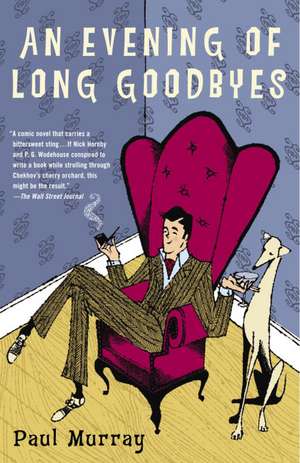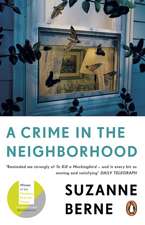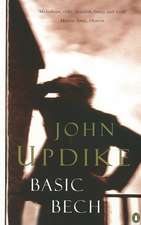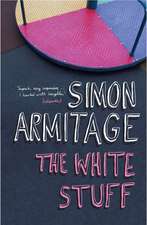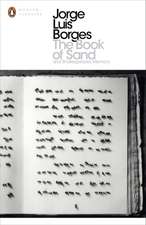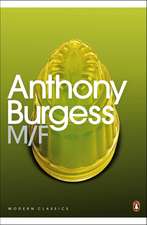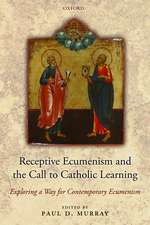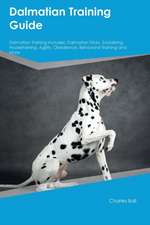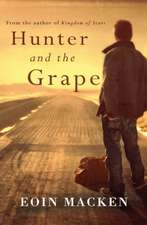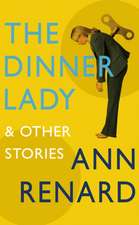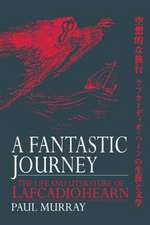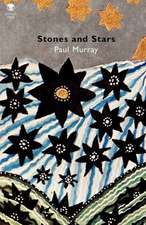An Evening of Long Goodbyes
Autor Paul Murrayen Limba Engleză Paperback – 31 aug 2005
Vezi toate premiile Carte premiată
Costa Book Awards (2003)
Charles Hythloday observes the world from the comfortable confines of Amaurot, his family estate, and doesn’t much care for what he sees. He prefers the black-and-white sanctum of classic cinema–especially anything starring the beautiful Gene Tierney–to the roiling and rumbling of twenty-first-century Dublin. At twenty-four, Charles aims to resurrect the lost lifestyle of the aristocratic country gentleman–contemplative walks, an ever-replenished drink, and afternoons filled with canapés as prepared by the Bosnian housekeeper, Mrs. P.
But Charles’s cozy existence is about to face a serious shake-up. His sister, Bel, an aspiring actress and hopeless romantic, has brought to Amaurot her most recent–and to Charles’s mind, most ill-advised–boyfriend. Frank is hulking and round, and resembles nothing so much as a large dresser, probably a Swedish one. He bets on greyhounds and talks endlessly of brawls and pubs in an accent that brings tears to Charles’s eyes. And, most suspiciously, his entrance into the Hythlodays’ lives just happens to coincide with the disappearance of an ever-increasing number of household antiques and baubles.
Soon, Charles and Bel discover that missing heirlooms are the least of their worries; they are simply not as rich as they have always believed. With the family fortune teetering in the balance, Charles must do something he swore he would never do: get a job. Booted into the mean streets of Dublin, he is as unprepared for real life as Frank would be for a cotillion. And it turns out that real life is a tad unprepared for Charles, as well.
From the Hardcover edition.
| Toate formatele și edițiile | Preț | Express |
|---|---|---|
| Paperback (2) | 54.95 lei 25-31 zile | +46.50 lei 5-11 zile |
| Penguin Books – 6 apr 2011 | 54.95 lei 25-31 zile | +46.50 lei 5-11 zile |
| Random House Trade – 31 aug 2005 | 118.51 lei 22-36 zile |
Preț: 118.51 lei
Nou
Puncte Express: 178
Preț estimativ în valută:
22.68€ • 23.59$ • 18.72£
22.68€ • 23.59$ • 18.72£
Carte disponibilă
Livrare economică 24 martie-07 aprilie
Preluare comenzi: 021 569.72.76
Specificații
ISBN-13: 9780812970401
ISBN-10: 0812970403
Pagini: 437
Dimensiuni: 131 x 205 x 26 mm
Greutate: 0.38 kg
Editura: Random House Trade
ISBN-10: 0812970403
Pagini: 437
Dimensiuni: 131 x 205 x 26 mm
Greutate: 0.38 kg
Editura: Random House Trade
Notă biografică
PAUL MURRAY was born in 1975. He studied English literature it Trinity College, Dublin, and took a master’s degree in creative writing at the University of East Anglia. A former bookseller, Murray lives in Dublin. An Evening of Long Goodbyes, his first novel, was shortlisted for the Whitbread Prize, and earned Murray a nomination for the Kerry Irish Fiction Award.
From the Hardcover edition.
From the Hardcover edition.
Extras
Chapter One
A black wind was blowing outside the bow window. All afternoon it had been playing its tricks: scooping up handfuls of leaves and flinging them over the lawn, spinning Old Man Thompson’s weather vane this way and that, seizing rapaciously at Bel’s ruby leather coat as she battled down the driveway to her audition. Now and then, from the rear of the house, I would hear it shriek through the bones of the Folly, and I’d look up from the TV with a start. If this were Kansas—I remember thinking—it might have been the beginnings of a terrible Twister; but this wasn’t Kansas, and what the wind blew in was worse than witches or winged monkeys. For today was the day that Frank arrived at Amaurot.
It was after four but I was still in my dressing gown, recuperating on the chaise longue in front of an old black-and-white movie that starred Mary Astor in an array of hats. I’d been out the night before with Pongo McGurks and possibly overdone it a little, insofar as I’d woken up on the billiard table with a splitting headache and wearing someone else’s sarong. By now, though, I was feeling much better. In fact, I was feeling particularly at one with the world, supping at a bowl of special medicinal consommé that Mrs. P. had made for me, thinking that no one wore a hat quite like Mary Astor—and then I caught my first sight of him, it: a large, vaguely humanoid shape shifting about behind the glass frieze that looked onto the hallway. It didn’t fit any of the shapes that should by rights have been there—not Bel’s slender figure, nor Mrs. P.’s squat domestic trapezium: This shape was bulky and distended, grotesquely so, like one of those self-assembly IKEA wardrobes I’d seen advertised on TV. I raised myself up on my elbows and called out: “Who’s there!”
There was no reply; and suddenly the figure was gone from the glass. I put down my consommé with a little sigh. I am not so vain as to think myself, in the general run of things, any more heroic than the next fellow; still, a man’s home is his castle, and when Swedish furniture decides to have a wander through it, one must take the appropriate measures. Tying the belt of my dressing gown and picking up the poker, I stole over to the drawing room door. The hallway was empty. I cupped a hand to my ear but heard only the sound of the house itself, like an endless exhalation of air echoing between the high ceilings and wood floors.
I was beginning to think I must have imagined it; but I seemed to remember someone telling me about a rash of break-ins recently, so just to be certain, I continued down the hall. There were plenty of nooks in which a miscreant could hide. Holding my poker at the ready in case he tried an ambush, I checked the library and the recital room—slowly twisting the knob, then swiftly thrusting open the door—to find nothing. Nothing lurked behind the Brancusi Janus; no one loomed beneath Mother’s sprawling poinsettia. On an impulse I tried the double doors of the ballroom; they were locked, of course, as they always were.
Relieved, I was on my way to the kitchen to have a cursory look around and also to see if there was anything by way of biscuits to follow the consommé, when a noise came from behind me. I spun round just as the door of the cloakroom burst open—and there, lumbering toward me, was the hideous Shape! Without the benefit of frosted glass between us, it was even more gruesome—my nerve quite failed me, the poker freezing midswing—
“Charles!” cried my sister, ghosting up suddenly at the Thing’s shoulder.
“Haugh,” the Thing snarled, before I recovered my wits and caught it a good blow on the temple, sending it tumbling to the floor with a thud which rattled Mother’s china collection clear in the next room.
There was a moment of silence. Outside the house the wind snapped and howled.
“God, Charles, what have you done?” Bel said, hovering apprehensively over the stricken beast.
“Don’t worry, he’s still breathing,” I reassured her. “Anyway, it’s no more than he deserves. Breaking into someone else’s house like that—it’s a good thing you weren’t here on your own, Bel, he’s a vicious-looking brute.”
“That’s frank, Charles,” she moaned.
“Yes, it is, and I wish you hadn’t had to see it, but the fact is that this is the world we live in, and—”
“No, you idiot, I mean that’s Frank, he’s a—a friend of mine. We’re going out this evening.” She knelt down to examine the creature’s forehead. “If he regains consciousness.”
“Oh,” I said. Through the door I glimpsed Mary Astor dancing a daring Charleston in a man’s trilby and wished—not for the first or the last time—that I could step into the screen and join her.
“Is that all you can say, ‘Oh’?” Bel half-rose again, the better to chastise me. “The poor guy takes an afternoon off work just to give me a lift back from that stupid audition, and then before I can even offer him a drink, you—you assault him.”
“I thought he was a burglar,” I protested.
“A burglar,” Bel repeated.
“Well, there’s been that rash of break-ins,” I said, “and”—there was really no nice way to put this—“he does look like a burglar, Bel, you have to admit. I mean, look at him.”
We turned our attention to the figure on the floor. He wore a denim jacket, a grubby white shirt, and nondescript brown shoes. He was very large and, in some unplaceable way, lumpy. His head, however, was what really fascinated me. It resembled some novice potter’s first attempt at a soup tureen, bulbous and pasty, with one beetling eyebrow, a stubbly jaw, and less than the full complement of teeth; to describe his ears as asymmetrical would be to do asymmetry a disservice.
“What do you mean, ‘disservice’?” Bel exclaimed when I pointed this out to her. “Charles, you practically kill someone and all you can think to do is stand around criticizing his ears? What’s wrong with you?”
“It’s not just his ears,” I said. “Think about it. Can you imagine what Mother would say, confronted with that?”
“I know quite well what she’d say,” Bel said sourly. “She’d say that she felt quite faint, and could someone please pour her a glass of gin.”
“Mother’s nerves are no laughing matter,” I reproved her, but she was already heading for the kitchen, reappearing a moment later with a tea towel full of ice cubes just as her creature was coming to its senses.
“Janey,” it said. “Fuck.”
“Are you all right?” Bel asked, after hauling it with both hands up to a sitting position.
“I dunno what happened,” the creature said. “I was lookin for the kitchen and I must have got lost cos then I was in this room with all these coats and then it was like somethin hit me . . .”
“You had an accident,” Bel told it, glaring icily in my direction.
“Well, all in the past now,” I said. “You could probably do with a drink, though. A cognac, maybe? Or actually, I was just going to make myself a gimlet, if I can tempt you . . .”
“A cup of tea’d be lovely,” the interloper said, dragging itself up off the parquet and, leaning on Bel’s shoulder, limping into the drawing room to sink down in my place on the chaise longue.
“Tea. Certainly,” I said graciously, as he picked up the remote control and Mary Astor’s smiling eyes were replaced by a straggly trail of dogs running about.
There was no response when I rang the service bell, and I was staring hopelessly at the range of kitchen cupboards when Bel came in. “Where does Mrs. P. keep the tea?” I said. She opened a door rather abruptly, nearly clipping my nose, to reveal a cabinet of glazed pots. “Do you think he wants Earl Grey? Is it a bit early?”
Bel sighed heavily, took a box of Band-Aids from a drawer, and left again.
Maybe he’d be better with Lapsang Souchong, I pondered, but then I decided I had been right the first time and carried in the tray with a plate of Mrs. P.’s amuse-bouches left over from the other night. Our guest was delighted with these and shoved them in fistfuls into his cavernous mouth. The tea, however, was less to his satisfaction. “Isn’t there any milk?” he asked.
I rolled my eyes at Bel, who flounced out of the room again with yet more sotto voce imprecations. Now the two of us were alone. I could feel him looking at me, and I knew the poker was within his reach. I kept my eyes fixed firmly on the television screen. The key was to show no fear. After a long, strained silence he addressed me. “Follow the football at all?” he said.
“No,” I said.
“Oh,” he said. He cleared his throat. “So . . . do youse live here all alone?” He had a thick Dublin brogue that made everything he said sound vaguely menacing.
“Hmm?” I said. Menace or not, I was becoming hypnotized by the dogs on TV. They were racing around their track at full pelt, despite appearing not to have been fed for several days; a small electric rabbit was leading them a merry dance. Frank repeated his question.
“Oh, yes, it’s just the two of us at the moment, and Mrs. P., of course. Father passed on a couple of years ago,” gesturing at the photograph on the wall, Father with that Westwood woman at a fashion thing in London, “and Mother has been unwell lately—nerves, you know. Quite a trouper, though, never complains.”
“Oh, right,” said Frank. He ruminated over this, then his mouth contorted itself into a sinister leer. “I’d say you’ve a bit of crack in the gaff though, without the oul pair knockin about?”
I didn’t understand quite what this meant, but it sounded like he was insinuating something unwholesome. “What?” I said.
“Parties, like, you must have a good few parties and stuff.”
“Oh, oh yes.” I relaxed. “We do. That is, I do. Bel usually prefers to mope about with her drama friends. It’s been pretty quiet lately, now that I come to think of it. But we’ve had some high times, all right. Back in April, for instance, a close friend of mine—Patsy Olé, maybe you know her? Everybody knows Patsy—”
He looked at me blankly.
“She’s gone now, anyway,” I continued, annoyed to hear a quaver in my voice as I said it—“India, Grand Tour sort of a thing, you know. Where was I? Oh yes, that night, absolute mayhem. This one chap, Pongo McGurks”—I leaned forward conspiratorially—“arrives at the stroke of midnight with an entire deer, bagged it over at the Guinness place in the mountains, and we . . .” I stopped, judging from his uncomprehending gaze that there was no point continuing this anecdote. We returned our attention to the greyhounds’ pursuit of their small, indigestible prey.
“So who’s this Mrs. P., then,” he asked suddenly, “your auntie or something?”
“Mrs. P.? Oh no. She’s the help. Bosnian, you know. Or is it Serbian? An absolute treasure, anyway. As I always say to Bel, if there’s one good thing to come out of all this fuss in the Balkans, it’s the availability of quality staff . . .” The words died away on my lips: once again I found myself trailing off in the stare of those unblinking eyes. This fellow was like some kind of after-dinner black hole. My anxiety began to mount again. Where was Bel anyway? What was she doing leaving me at the mercy of this primate? Did she want me rent limb from limb and stuffed up the chimney?
“Excuse me a moment,” I said, getting to my feet and tracking her down to her bedroom, where she stood contemplating her shoe rack.
“Charles, for God’s sake, no one’s going to stuff you up any chimneys,” she said. “I’m trying to change here, do you mind? I’ll be back down in a minute.”
“Well I do mind,” I said. “As a matter of fact I mind very much. I thought you’d just gone for milk.”
“Charles”—Bel turned, waving her hairbrush impatiently—“can’t you just not be weird for five minutes, and just talk to him until—”
“I’ve tried talking to him,” I said, drawing aside the curtain to see the wind still careering over the long grass. “Everything I say just gets sort of . . . absorbed. It’s very off-putting. And then I worry that he’ll get hungry, and mistake me for a brisket.”
“Well if you’d simply allow me to get dressed, then I— Come to think of it, are you planning to put on clothes at all today? Or have we reached a new stage in your seemingly interminable decline?”
“What decline?” I said. She stomped barefoot past me to the chest of drawers. “What’s that supposed to mean?”
From the Hardcover edition.
A black wind was blowing outside the bow window. All afternoon it had been playing its tricks: scooping up handfuls of leaves and flinging them over the lawn, spinning Old Man Thompson’s weather vane this way and that, seizing rapaciously at Bel’s ruby leather coat as she battled down the driveway to her audition. Now and then, from the rear of the house, I would hear it shriek through the bones of the Folly, and I’d look up from the TV with a start. If this were Kansas—I remember thinking—it might have been the beginnings of a terrible Twister; but this wasn’t Kansas, and what the wind blew in was worse than witches or winged monkeys. For today was the day that Frank arrived at Amaurot.
It was after four but I was still in my dressing gown, recuperating on the chaise longue in front of an old black-and-white movie that starred Mary Astor in an array of hats. I’d been out the night before with Pongo McGurks and possibly overdone it a little, insofar as I’d woken up on the billiard table with a splitting headache and wearing someone else’s sarong. By now, though, I was feeling much better. In fact, I was feeling particularly at one with the world, supping at a bowl of special medicinal consommé that Mrs. P. had made for me, thinking that no one wore a hat quite like Mary Astor—and then I caught my first sight of him, it: a large, vaguely humanoid shape shifting about behind the glass frieze that looked onto the hallway. It didn’t fit any of the shapes that should by rights have been there—not Bel’s slender figure, nor Mrs. P.’s squat domestic trapezium: This shape was bulky and distended, grotesquely so, like one of those self-assembly IKEA wardrobes I’d seen advertised on TV. I raised myself up on my elbows and called out: “Who’s there!”
There was no reply; and suddenly the figure was gone from the glass. I put down my consommé with a little sigh. I am not so vain as to think myself, in the general run of things, any more heroic than the next fellow; still, a man’s home is his castle, and when Swedish furniture decides to have a wander through it, one must take the appropriate measures. Tying the belt of my dressing gown and picking up the poker, I stole over to the drawing room door. The hallway was empty. I cupped a hand to my ear but heard only the sound of the house itself, like an endless exhalation of air echoing between the high ceilings and wood floors.
I was beginning to think I must have imagined it; but I seemed to remember someone telling me about a rash of break-ins recently, so just to be certain, I continued down the hall. There were plenty of nooks in which a miscreant could hide. Holding my poker at the ready in case he tried an ambush, I checked the library and the recital room—slowly twisting the knob, then swiftly thrusting open the door—to find nothing. Nothing lurked behind the Brancusi Janus; no one loomed beneath Mother’s sprawling poinsettia. On an impulse I tried the double doors of the ballroom; they were locked, of course, as they always were.
Relieved, I was on my way to the kitchen to have a cursory look around and also to see if there was anything by way of biscuits to follow the consommé, when a noise came from behind me. I spun round just as the door of the cloakroom burst open—and there, lumbering toward me, was the hideous Shape! Without the benefit of frosted glass between us, it was even more gruesome—my nerve quite failed me, the poker freezing midswing—
“Charles!” cried my sister, ghosting up suddenly at the Thing’s shoulder.
“Haugh,” the Thing snarled, before I recovered my wits and caught it a good blow on the temple, sending it tumbling to the floor with a thud which rattled Mother’s china collection clear in the next room.
There was a moment of silence. Outside the house the wind snapped and howled.
“God, Charles, what have you done?” Bel said, hovering apprehensively over the stricken beast.
“Don’t worry, he’s still breathing,” I reassured her. “Anyway, it’s no more than he deserves. Breaking into someone else’s house like that—it’s a good thing you weren’t here on your own, Bel, he’s a vicious-looking brute.”
“That’s frank, Charles,” she moaned.
“Yes, it is, and I wish you hadn’t had to see it, but the fact is that this is the world we live in, and—”
“No, you idiot, I mean that’s Frank, he’s a—a friend of mine. We’re going out this evening.” She knelt down to examine the creature’s forehead. “If he regains consciousness.”
“Oh,” I said. Through the door I glimpsed Mary Astor dancing a daring Charleston in a man’s trilby and wished—not for the first or the last time—that I could step into the screen and join her.
“Is that all you can say, ‘Oh’?” Bel half-rose again, the better to chastise me. “The poor guy takes an afternoon off work just to give me a lift back from that stupid audition, and then before I can even offer him a drink, you—you assault him.”
“I thought he was a burglar,” I protested.
“A burglar,” Bel repeated.
“Well, there’s been that rash of break-ins,” I said, “and”—there was really no nice way to put this—“he does look like a burglar, Bel, you have to admit. I mean, look at him.”
We turned our attention to the figure on the floor. He wore a denim jacket, a grubby white shirt, and nondescript brown shoes. He was very large and, in some unplaceable way, lumpy. His head, however, was what really fascinated me. It resembled some novice potter’s first attempt at a soup tureen, bulbous and pasty, with one beetling eyebrow, a stubbly jaw, and less than the full complement of teeth; to describe his ears as asymmetrical would be to do asymmetry a disservice.
“What do you mean, ‘disservice’?” Bel exclaimed when I pointed this out to her. “Charles, you practically kill someone and all you can think to do is stand around criticizing his ears? What’s wrong with you?”
“It’s not just his ears,” I said. “Think about it. Can you imagine what Mother would say, confronted with that?”
“I know quite well what she’d say,” Bel said sourly. “She’d say that she felt quite faint, and could someone please pour her a glass of gin.”
“Mother’s nerves are no laughing matter,” I reproved her, but she was already heading for the kitchen, reappearing a moment later with a tea towel full of ice cubes just as her creature was coming to its senses.
“Janey,” it said. “Fuck.”
“Are you all right?” Bel asked, after hauling it with both hands up to a sitting position.
“I dunno what happened,” the creature said. “I was lookin for the kitchen and I must have got lost cos then I was in this room with all these coats and then it was like somethin hit me . . .”
“You had an accident,” Bel told it, glaring icily in my direction.
“Well, all in the past now,” I said. “You could probably do with a drink, though. A cognac, maybe? Or actually, I was just going to make myself a gimlet, if I can tempt you . . .”
“A cup of tea’d be lovely,” the interloper said, dragging itself up off the parquet and, leaning on Bel’s shoulder, limping into the drawing room to sink down in my place on the chaise longue.
“Tea. Certainly,” I said graciously, as he picked up the remote control and Mary Astor’s smiling eyes were replaced by a straggly trail of dogs running about.
There was no response when I rang the service bell, and I was staring hopelessly at the range of kitchen cupboards when Bel came in. “Where does Mrs. P. keep the tea?” I said. She opened a door rather abruptly, nearly clipping my nose, to reveal a cabinet of glazed pots. “Do you think he wants Earl Grey? Is it a bit early?”
Bel sighed heavily, took a box of Band-Aids from a drawer, and left again.
Maybe he’d be better with Lapsang Souchong, I pondered, but then I decided I had been right the first time and carried in the tray with a plate of Mrs. P.’s amuse-bouches left over from the other night. Our guest was delighted with these and shoved them in fistfuls into his cavernous mouth. The tea, however, was less to his satisfaction. “Isn’t there any milk?” he asked.
I rolled my eyes at Bel, who flounced out of the room again with yet more sotto voce imprecations. Now the two of us were alone. I could feel him looking at me, and I knew the poker was within his reach. I kept my eyes fixed firmly on the television screen. The key was to show no fear. After a long, strained silence he addressed me. “Follow the football at all?” he said.
“No,” I said.
“Oh,” he said. He cleared his throat. “So . . . do youse live here all alone?” He had a thick Dublin brogue that made everything he said sound vaguely menacing.
“Hmm?” I said. Menace or not, I was becoming hypnotized by the dogs on TV. They were racing around their track at full pelt, despite appearing not to have been fed for several days; a small electric rabbit was leading them a merry dance. Frank repeated his question.
“Oh, yes, it’s just the two of us at the moment, and Mrs. P., of course. Father passed on a couple of years ago,” gesturing at the photograph on the wall, Father with that Westwood woman at a fashion thing in London, “and Mother has been unwell lately—nerves, you know. Quite a trouper, though, never complains.”
“Oh, right,” said Frank. He ruminated over this, then his mouth contorted itself into a sinister leer. “I’d say you’ve a bit of crack in the gaff though, without the oul pair knockin about?”
I didn’t understand quite what this meant, but it sounded like he was insinuating something unwholesome. “What?” I said.
“Parties, like, you must have a good few parties and stuff.”
“Oh, oh yes.” I relaxed. “We do. That is, I do. Bel usually prefers to mope about with her drama friends. It’s been pretty quiet lately, now that I come to think of it. But we’ve had some high times, all right. Back in April, for instance, a close friend of mine—Patsy Olé, maybe you know her? Everybody knows Patsy—”
He looked at me blankly.
“She’s gone now, anyway,” I continued, annoyed to hear a quaver in my voice as I said it—“India, Grand Tour sort of a thing, you know. Where was I? Oh yes, that night, absolute mayhem. This one chap, Pongo McGurks”—I leaned forward conspiratorially—“arrives at the stroke of midnight with an entire deer, bagged it over at the Guinness place in the mountains, and we . . .” I stopped, judging from his uncomprehending gaze that there was no point continuing this anecdote. We returned our attention to the greyhounds’ pursuit of their small, indigestible prey.
“So who’s this Mrs. P., then,” he asked suddenly, “your auntie or something?”
“Mrs. P.? Oh no. She’s the help. Bosnian, you know. Or is it Serbian? An absolute treasure, anyway. As I always say to Bel, if there’s one good thing to come out of all this fuss in the Balkans, it’s the availability of quality staff . . .” The words died away on my lips: once again I found myself trailing off in the stare of those unblinking eyes. This fellow was like some kind of after-dinner black hole. My anxiety began to mount again. Where was Bel anyway? What was she doing leaving me at the mercy of this primate? Did she want me rent limb from limb and stuffed up the chimney?
“Excuse me a moment,” I said, getting to my feet and tracking her down to her bedroom, where she stood contemplating her shoe rack.
“Charles, for God’s sake, no one’s going to stuff you up any chimneys,” she said. “I’m trying to change here, do you mind? I’ll be back down in a minute.”
“Well I do mind,” I said. “As a matter of fact I mind very much. I thought you’d just gone for milk.”
“Charles”—Bel turned, waving her hairbrush impatiently—“can’t you just not be weird for five minutes, and just talk to him until—”
“I’ve tried talking to him,” I said, drawing aside the curtain to see the wind still careering over the long grass. “Everything I say just gets sort of . . . absorbed. It’s very off-putting. And then I worry that he’ll get hungry, and mistake me for a brisket.”
“Well if you’d simply allow me to get dressed, then I— Come to think of it, are you planning to put on clothes at all today? Or have we reached a new stage in your seemingly interminable decline?”
“What decline?” I said. She stomped barefoot past me to the chest of drawers. “What’s that supposed to mean?”
From the Hardcover edition.
Recenzii
"Paul Murray manages to fit a brilliant social novel in the small spaces of a farce, without ever losing his lightness of touch or his sense of humor. The result is something absolutely unique. Murray starts with Wodehouse (and does him proud), but ends somewhere entirely his own–somewhere very, very funny and surprisingly touching. I really love this book."
–Arthur Phillips, bestselling author of Prague
“A lyrical, satirical tour de force, a huge, hilarious elegy. A surreal and very funny festival of truths, fictions, luck, and love. How can this be a first novel? A triumph.”
–Ali Smith, Booker Prize finalist and author of Hotel World
“One of the most entertaining and laugh-out-loud Irish yarns of recent years.”
–Irish Independent
“The plot scuttles along with Wodehouse-like delirium. . . . Murray’s clearly having fun, but beneath the bouncy tone he manages to weave real depth into the characters’ relationships.”
–Time Out (London)
“A hilarious, rich and satisfying novel.”
–The Times Literary Supplement
“[A] comedy of the highest caliber.”
–The Sunday Tribune (Ireland)
From the Hardcover edition.
–Arthur Phillips, bestselling author of Prague
“A lyrical, satirical tour de force, a huge, hilarious elegy. A surreal and very funny festival of truths, fictions, luck, and love. How can this be a first novel? A triumph.”
–Ali Smith, Booker Prize finalist and author of Hotel World
“One of the most entertaining and laugh-out-loud Irish yarns of recent years.”
–Irish Independent
“The plot scuttles along with Wodehouse-like delirium. . . . Murray’s clearly having fun, but beneath the bouncy tone he manages to weave real depth into the characters’ relationships.”
–Time Out (London)
“A hilarious, rich and satisfying novel.”
–The Times Literary Supplement
“[A] comedy of the highest caliber.”
–The Sunday Tribune (Ireland)
From the Hardcover edition.
Descriere
Charles Hythloday observes the world from the comfortable confines of Amaurot, his family estate. Unfortunately, with the family fortune teetering in the balance, Charles must do something he swore he would never do: get a job.
Premii
- Costa Book Awards Nominee, 2003
